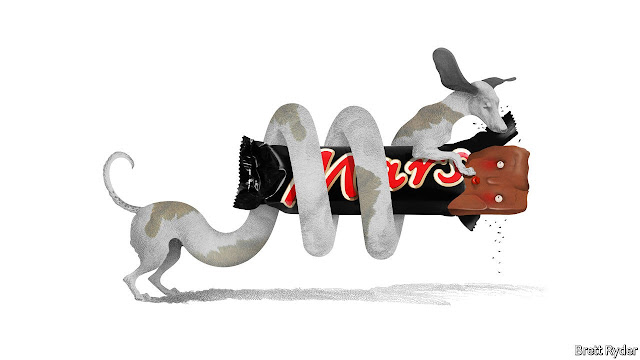Mars Inc. has the right balance of purpose and profit
Mars, based in McLean, Virginia, since 1974, is now the world's largest confectioner thanks to brands like m&ms
Slough, a sleepy hamlet near London's Heathrow Airport, is Mars Inc's mystical spiritual home. It's not the kind of place where you'd want to spend your sweetest dreams. It is the setting for Ricky Gervais' "The Office" in the United Kingdom.
Also in the 1930s, during the Great Depression, Forrest Mars developed two business concepts and a management philosophy that continue to have an impact on the world today.
The Mars Bar's origin story is well-known
While sipping on a malted milk with his father in Chicago in the 1920s, Forrest Sr. came up with the idea of pouring malted milk chocolate filling into a chocolate bar. As a result, the Milky Way galaxy formed. Slough, a small town in the flight path to Heathrow Airport, is the headquarters of Mars Inc. It's not the kind of place you'd imagine in your dreams. It is the setting for Ricky Gervais' "The Office" in the United Kingdom.
Also in the 1930s, during the Great Depression, Forrest Mars developed two business concepts and a management philosophy that continue to have an impact on the world today.Many people are familiar with the story of how Mars Bar came to be.
Back in Chicago in the 1920s, Forrest Sr reconnected with his estranged chocolatier father and had the epiphany of pouring malted milk chocolate filling into a candy bar over a malted milk beverage. Hence was conceived of our Milky Way.
Even though his father was a fiery and successful businessman, Forrest Sr. was estranged from him and ended up in Slough. The Milky Way was renamed the Mars Bar by him there. It took off at a time when people were desperate for cheap calories.
SPONSORED LINK
- wonder leaf CBD oil for penile growth
- wonder leaf CBD oil near me
- wonder leaf CBD oil uses
- wonder leaf CBD how to use
- wonder leaf CBD oil
Get More Information
- https://www.facebook.com/wonderleafcbdoils/reviews
- https://techplanet.today/post/wonder-leaf-cbd-oil-reviews-2022-how-to-use-and-its-pros-and-cons
Mars, headquartered in McLean, Virginia, since 1974, is the world's largest confectioner thanks to well-known brands like m&ms.The origin of the Mars empire's dark horse, pet food, is less well known. As he visited Slough, Forrest Sr. became aware of how dog-loving Brits were. He didn't like how they snatched scraps from the table and tucked them into their mouths.
Thus, in 1935, he purchased the manufacturer of tinned dog food, Chappie. Mars estimates that it serves half of the world's pets today. Royal Canin, a high-end dog food manufacturer, is the company's most popular product.
It's one of the biggest veterinary care providers. The company announced on June 22nd that Poul Weihrauch, the head of pet care, would succeed Grant Reid as CEO. To a degree, Weihrauch's promotion reflects an increase in the importance of the pet business, which now accounts for 58 percent of sales (38 percent ). The rest is taken care of by what you eat.
Sales figures were also released by the family-owned company, which is known for its secrecy about its finances. According to the data, revenues have increased by more than 50% since Reid took office in 2014. These are bigger than Coca-in Cola's terms of market share.
Quality, responsibility, mutuality, efficiency, and freedom are all part of the Five Principles, which the company attributes to Forrest Srwork .'s in Slough.They may sound like a bunch of corporate jargon. These companies are successful because they strike the right balance between making a profit and contributing to a greater good.
"Stakeholder capitalism" has become a trendy buzzword in the corporate world. Few are as good at it as Mars.Consider the company's relationship with its only shareholders, the family, which, according to Forbes magazine, is worth about $96 billion.
The g4 generation, abbreviated as g4, is the most versatile. They have a wide range of priorities, from environmental sustainability to the well-being of "associates," just like shareholders everywhere (Martian for employees). However, the company's leadership mandate places financial performance and long-term growth on a par with positive social impact and trust in the company.
Only about 10% of the company's profits are distributed to shareholders. As a result, Mars is able to reinvest the remaining funds back into its business, preserving its solid financial position and commitment to self-reliance. They don't do much of anything.
That's in keeping with Mars's egalitarian values and preference for personal privacy. In addition, they retain some of Forrest Sr's peculiarities.A former board member recalls factory visits with family members where everyone tried a mouthful of canned dog food to ensure that it was safe and healthy for their pets to consume. "It reminds me of pâté." He says, "You get used to it."
"We don't come into work every day and chomp away," a current executive insists, though the practise continues.Then there's the company itself. Since the year 2001, it has been professionally managed. In the absence of managers threatening to blow up the company's reputation, those familiar with the Mars family say the family does not meddle very much. There is a long history of responsibility delegation.
Mars has a flat management structure with no perks for bosses, such as their own parking space or a private jet. Even at a young age, associates are given the authority to make important decisions. It's fine if they take a calculated risk that goes awry. There will be no tolerance for any unethical behaviour.
Competitors say that the company is competitive but not aggressive. It used to be known primarily for its strong factory culture, operational efficiency, and returns measured in relation to its physical assets. However, these attributes have faded in recent years. As the veterinary-services industry has grown, however, this is no longer the case.
It now emphasises the company's more ethereal aspects. In a rival company, a rival executive says, "If you meet a Mars guy, they will talk about brands and people all the time."
This comes at a cost: $1 billion in sustainable initiatives like renewable energy, as well as a policy of paying all taxes due
The company, however, only discusses these topics publicly when they are relevant to its business. It stays out of political squabbles and steers clear of pontificating on every topic under the sun.Then there's the question of the future. Mars is in a strong position to expand further, thanks to low debt, ample cash, and products that are resistant to economic turbulence.
Competitors like Kellogg, a food company, are selling off parts of their businesses to raise money for new products. Although Wrigley, a chewing gum manufacturer, was not one of Mars' best acquisitions, it has remained a part of the company. In today's inflationary turmoil, it could pick up even more.
Stakeholderism, or what Mars calls "mutuality," is a strategy in which the company says it considers the interests of all stakeholders, including customers, employees, suppliers, communities, and the environment.



Comments
Post a Comment